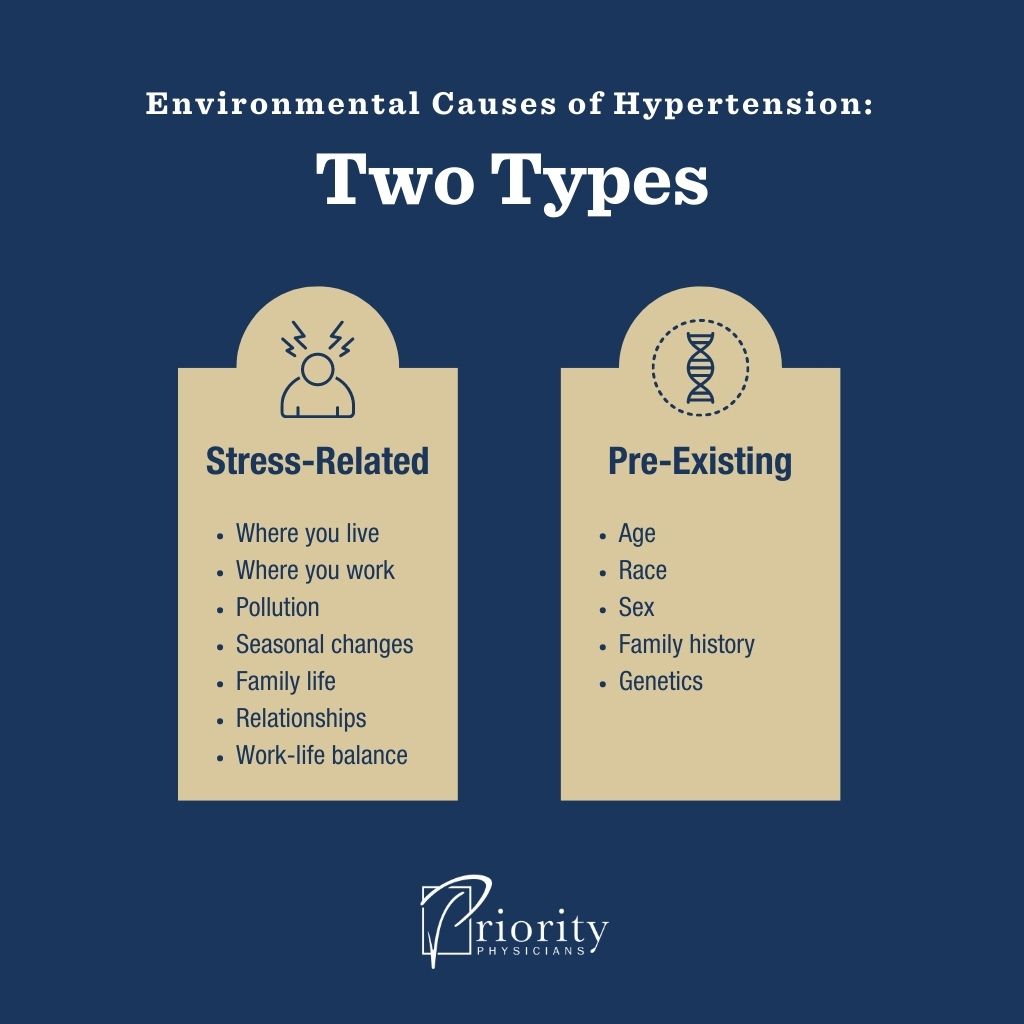When you think of environmental causes of hypertension (high blood pressure), you might picture stress-inducing traffic jams in crowded cities. Lots of people packed in a small space, yelling and honking at each other.
It’s a stressful situation, and stress does lead to high blood pressure. But the environmental causes of hypertension are more than traffic jams in crowded cities. They include both your external and internal environment, and rest largely outside your control.
We previously discussed how factors like medication and lifestyle affect blood pressure. In this post, we’ll look at environmental causes of hypertension and how they affect the body.
Environmental Causes of Hypertension: Two Types
Of the three causes of hypertension we’ve discussed, environment is perhaps the trickiest because it’s the one most outside your control.
We can classify environmental causes of high blood pressure in two broad categories: stress-related and pre-existing. Stress-related causes involve external factors in your physical and emotional environment, including:
- Where you live
- Where you work
- Pollution
- Seasonal changes
- Family life
- Relationships
- Work-life balance
Pre-existing causes involve factors related to your body’s internal environment that you can’t control. They include:
- Age
- Race
- Sex
- Family history
- Genetics

How Does Stress Affect Blood Pressure?
Everyone has stress, and it doesn’t just live in the mind. Stress has some very real effects on the body.
Stress causes the body to produce cortisol, a hormone that helps it respond in fight-or-flight situations. But modern stress isn’t usually in response to physical danger. Instead, our man-made high-stress environment is full of milder “threats” that never seem to fully go away, keeping our bodies flooded with cortisol.
In the brain, this excess cortisol can cause issues with cognition, memory, and mood. When you’re under a lot of stress, your mind can feel overactive, making it hard to get a good night’s sleep. And if you’ve read our other posts about sleep, you know how important sleep is for good health.
In the body, excess cortisol can lead to weight gain, osteoporosis, and increased inflammation. Stress even causes vasoconstriction — a narrowing of the blood vessels — making your heart work harder to pump blood through smaller tubes and increasing your blood pressure.
Sustained stress isn’t a healthy situation for anyone, so it’s important to find ways to reduce chronic stress and manage what’s beyond your control.
Sources of Stress in Personal Life
Everyone’s preferences, personalities, and personal lives are so different, and what causes stress in one person may not cause it in another. It’s helpful to identify what causes you stress in your personal life so you can develop strategies to manage it.
In our busy society, for example, many people’s schedules get filled to the brim. This might include drinks after work with friends or a host of weekend pursuits. Because these fall into the “fun” category, you may not realize they’re actually causing stress in your life.
Work, of course, and a lack of work-life balance can create chronic stress, as can managing family situations and schedules. Kids’ sports are notoriously time-consuming, and if you have multiple children involved in multiple activities, it can be a financial and logistical nightmare.
On the other end of the spectrum, caring for an aging parent can be an incredibly stressful undertaking. Providing or arranging care can be emotionally, financially, and even physically taxing, and can certainly lead to stress and high blood pressure.
Few of these elements are completely avoidable. Jobs are stressful, kids play sports, and you need social engagement. Many parents will need support at some point. You have some influence over these factors: You can change jobs, reserve time for rest, and limit the number of sports your kids play. But if you don’t learn to identify and manage stress, your health will suffer under the pressures of everyday life.
Sources of Stress in Global Events
Thanks to social media and the 24-hour news cycle, global events always feel close by. Global conflicts, famine, and tragedies near and far can raise your blood pressure, even if you aren’t directly involved.
And unless you’re a major world leader, such global events are completely outside your control. (If you’re reading this and can control these, please, shoot us an email!) This can leave you feeling helpless, stressed, and frustrated.
To manage stress from global events, you can try a few strategies. One is to learn to let go of the frustration over circumstances you can’t influence. This doesn’t mean you have to stop caring, just that you recognize you can’t control everything.
Another strategy is to try to understand someone else’s point of view. Understanding alternative perspectives can at times help mitigate and process stress.
Finally, you can also reduce your exposure to stress through news and social media. Some studies are looking into the link between high blood pressure and social media use. Doom scrolling, or scrolling through negative news and/or social media, can have detrimental effects on your sleep, your mood, and, yes, your blood pressure.
Try taking breaks from news and media. Take a walk outside in the fresh air. Go to sleep without your phone. Pause the influx of global stressors and allow your stress to dissipate. Your blood pressure will be better for it.
How Do Pre-Existing Factors Affect Blood Pressure?
Certain pre-existing factors put you at a higher risk of developing hypertension. You can’t change these factors, but it’s important to be aware of them so you can manage your risk.
Age. As you age, your blood vessels lose elasticity and harden. Because the vessels can’t dilate, they stay constricted, which leads to high blood pressure. And until the fountain of youth is discovered, there’s no stopping aging.
Race. African Americans and Hispanics tend to have higher blood pressure than Caucasians, and so may need earlier and more frequent screening.
Sex. Men tend to have higher blood pressure than women and may need earlier screening.
Genetics and family history. Some people have blue eyes, some have brown hair, and some have less elastic blood vessels, leading to higher blood pressure. And if your parents and grandparents had high blood pressure, there’s a good chance you will too.
What to Do About Hypertension
You may not be able to change all environmental causes of hypertension, but you can manage your risk.
The first step is knowing whether your blood pressure is getting into a worrisome range. You don’t need to check it all the time or buy a machine to keep at home. But you can use the blood pressure kiosk at your neighborhood pharmacy or Walmart to get an idea of what ballpark you’re in. You can also check in with your doctor about whether your blood pressure is trending upward and discuss what to do about it.
Remember, blood pressure is most treatable before it’s a problem. Waiting until it causes noticeable symptoms is dangerous. All too often, the first symptom of high blood pressure is a sudden heart attack.
So when it comes to stressors, reduce what you can and develop strategies to manage the rest. Talk with your doctor or a therapist for helpful outside input. And remember to get regular screening, especially if you have one or more pre-existing risk factors.

